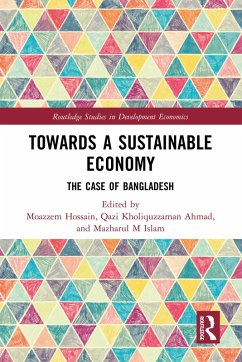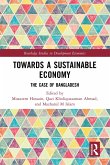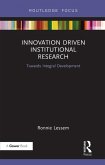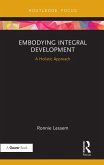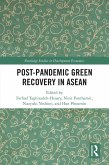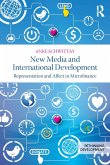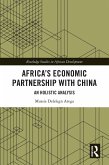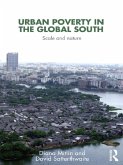Towards a Sustainable Economy (eBook, ePUB)
The Case of Bangladesh
Redaktion: Hossain, Moazzem; Islam, Mazharul M; Ahmad, Qazi Kholiquzzaman
41,95 €
41,95 €
inkl. MwSt.
Sofort per Download lieferbar

21 °P sammeln
41,95 €
Als Download kaufen

41,95 €
inkl. MwSt.
Sofort per Download lieferbar

21 °P sammeln
Jetzt verschenken
Alle Infos zum eBook verschenken
41,95 €
inkl. MwSt.
Sofort per Download lieferbar
Alle Infos zum eBook verschenken

21 °P sammeln
Towards a Sustainable Economy (eBook, ePUB)
The Case of Bangladesh
Redaktion: Hossain, Moazzem; Islam, Mazharul M; Ahmad, Qazi Kholiquzzaman
- Format: ePub
- Merkliste
- Auf die Merkliste
- Bewerten Bewerten
- Teilen
- Produkt teilen
- Produkterinnerung
- Produkterinnerung

Bitte loggen Sie sich zunächst in Ihr Kundenkonto ein oder registrieren Sie sich bei
bücher.de, um das eBook-Abo tolino select nutzen zu können.
Hier können Sie sich einloggen
Hier können Sie sich einloggen
Sie sind bereits eingeloggt. Klicken Sie auf 2. tolino select Abo, um fortzufahren.

Bitte loggen Sie sich zunächst in Ihr Kundenkonto ein oder registrieren Sie sich bei bücher.de, um das eBook-Abo tolino select nutzen zu können.
This book examines Bangladesh's ascendancy in socio-economic terms and the prospects of Bangladesh overcoming the challenges to become a higher middle-income nation by 2030.
- Geräte: eReader
- mit Kopierschutz
- eBook Hilfe
Andere Kunden interessierten sich auch für
![Towards a Sustainable Economy (eBook, PDF) Towards a Sustainable Economy (eBook, PDF)]() Towards a Sustainable Economy (eBook, PDF)41,95 €
Towards a Sustainable Economy (eBook, PDF)41,95 €![Innovation Driven Institutional Research (eBook, ePUB) Innovation Driven Institutional Research (eBook, ePUB)]() Ronnie LessemInnovation Driven Institutional Research (eBook, ePUB)23,95 €
Ronnie LessemInnovation Driven Institutional Research (eBook, ePUB)23,95 €![Embodying Integral Development (eBook, ePUB) Embodying Integral Development (eBook, ePUB)]() Ronnie LessemEmbodying Integral Development (eBook, ePUB)24,95 €
Ronnie LessemEmbodying Integral Development (eBook, ePUB)24,95 €![Post-Pandemic Green Recovery in ASEAN (eBook, ePUB) Post-Pandemic Green Recovery in ASEAN (eBook, ePUB)]() Post-Pandemic Green Recovery in ASEAN (eBook, ePUB)42,95 €
Post-Pandemic Green Recovery in ASEAN (eBook, ePUB)42,95 €![New Media and International Development (eBook, ePUB) New Media and International Development (eBook, ePUB)]() Anke SchwittayNew Media and International Development (eBook, ePUB)52,95 €
Anke SchwittayNew Media and International Development (eBook, ePUB)52,95 €![Africa's Economic Partnership with China (eBook, ePUB) Africa's Economic Partnership with China (eBook, ePUB)]() Mussie Delelegn AregaAfrica's Economic Partnership with China (eBook, ePUB)42,95 €
Mussie Delelegn AregaAfrica's Economic Partnership with China (eBook, ePUB)42,95 €![Urban Poverty in the Global South (eBook, ePUB) Urban Poverty in the Global South (eBook, ePUB)]() Diana MitlinUrban Poverty in the Global South (eBook, ePUB)57,95 €
Diana MitlinUrban Poverty in the Global South (eBook, ePUB)57,95 €-
-
-
This book examines Bangladesh's ascendancy in socio-economic terms and the prospects of Bangladesh overcoming the challenges to become a higher middle-income nation by 2030.
Dieser Download kann aus rechtlichen Gründen nur mit Rechnungsadresse in A, B, BG, CY, CZ, D, DK, EW, E, FIN, F, GR, HR, H, IRL, I, LT, L, LR, M, NL, PL, P, R, S, SLO, SK ausgeliefert werden.
Produktdetails
- Produktdetails
- Verlag: Taylor & Francis eBooks
- Seitenzahl: 316
- Erscheinungstermin: 30. Dezember 2022
- Englisch
- ISBN-13: 9781000832013
- Artikelnr.: 66867490
- Verlag: Taylor & Francis eBooks
- Seitenzahl: 316
- Erscheinungstermin: 30. Dezember 2022
- Englisch
- ISBN-13: 9781000832013
- Artikelnr.: 66867490
- Herstellerkennzeichnung Die Herstellerinformationen sind derzeit nicht verfügbar.
Moazzem Hossain has taught at Griffith University, Australia, since 1990 and he holds an adjunct associate professorial position presently in the Department of Business Strategy and Innovation (BSI), Griffith Business School at Griffith University, Australia. He was the inaugural Sheikh Mujibur Rahman (SMR) Professorial Fellow at University of Hull, UK, in 2000. Currently he is the chairman of the Board of Trustees of the University of Skill Enrichment and Technology (USET), Narayangonj, Bangladesh. Qazi Kholiquzzaman Ahmad is widely known at home and abroad as a renowned economist. He was the founding chairman of Bangladesh Unnayan Parishad (BUP). He is currently the chairman of the Palli Karma-Sahayak Foundation (PKSF) and the Dhaka School of Economics (DScE). He was the elected president of the Bangladesh Economic Association (BEA) for three consecutive terms (2002-2010). Mazharul M Islam has been working as a Faraday Institute Research Fellow at the Department of Chemistry of the Cardiff University, UK, since 2021.
PART I: Overview Introduction 1. Socio-Economics of Bangladesh: Present
Status and Future Trajectory PART II: Transformation over 1996 to 2020 2.
Manufacturing, Growth and Structural Transformation: The case of Bangladesh
3. Remittances, Foreign Aid and Economic Growth in Bangladesh: An Empirical
Analysis4. Impact of COVID-19 on the Ready Made Garments Industry of
Bangladesh 5. Energy Consumption and GDP Nexus in Bangladesh 6.
Determinants of Sustainable Foreign Direct Investments in Bangladesh PART
III: Innovation and Opportunities 7. Nonfarm Employment and Household
Calorie Consumption in Rural Bangladesh 8. Bangladesh's Agricultural Growth
and Development over Fifty Years 9. Green Energy Development in the Era of
the Fourth Industrial Revolution: Lessons from the Developed World PART IV:
Challenges to 2030 10. Poverty and Inequality Reduction in Bangladesh:
Towards Making Growth Inclusive and Adopting Transformative Social Policy
11. Bangladesh's Rohingya Conundrum 12. Sanitation Development in Asia:
India, Bangladesh and Cambodia Compared PART V: Conclusions 13. Sustainable
Growth and Bangladesh's Prospects of Long-term Prosperity
Status and Future Trajectory PART II: Transformation over 1996 to 2020 2.
Manufacturing, Growth and Structural Transformation: The case of Bangladesh
3. Remittances, Foreign Aid and Economic Growth in Bangladesh: An Empirical
Analysis4. Impact of COVID-19 on the Ready Made Garments Industry of
Bangladesh 5. Energy Consumption and GDP Nexus in Bangladesh 6.
Determinants of Sustainable Foreign Direct Investments in Bangladesh PART
III: Innovation and Opportunities 7. Nonfarm Employment and Household
Calorie Consumption in Rural Bangladesh 8. Bangladesh's Agricultural Growth
and Development over Fifty Years 9. Green Energy Development in the Era of
the Fourth Industrial Revolution: Lessons from the Developed World PART IV:
Challenges to 2030 10. Poverty and Inequality Reduction in Bangladesh:
Towards Making Growth Inclusive and Adopting Transformative Social Policy
11. Bangladesh's Rohingya Conundrum 12. Sanitation Development in Asia:
India, Bangladesh and Cambodia Compared PART V: Conclusions 13. Sustainable
Growth and Bangladesh's Prospects of Long-term Prosperity
PART I: Overview Introduction 1. Socio-Economics of Bangladesh: Present
Status and Future Trajectory PART II: Transformation over 1996 to 2020 2.
Manufacturing, Growth and Structural Transformation: The case of Bangladesh
3. Remittances, Foreign Aid and Economic Growth in Bangladesh: An Empirical
Analysis4. Impact of COVID-19 on the Ready Made Garments Industry of
Bangladesh 5. Energy Consumption and GDP Nexus in Bangladesh 6.
Determinants of Sustainable Foreign Direct Investments in Bangladesh PART
III: Innovation and Opportunities 7. Nonfarm Employment and Household
Calorie Consumption in Rural Bangladesh 8. Bangladesh's Agricultural Growth
and Development over Fifty Years 9. Green Energy Development in the Era of
the Fourth Industrial Revolution: Lessons from the Developed World PART IV:
Challenges to 2030 10. Poverty and Inequality Reduction in Bangladesh:
Towards Making Growth Inclusive and Adopting Transformative Social Policy
11. Bangladesh's Rohingya Conundrum 12. Sanitation Development in Asia:
India, Bangladesh and Cambodia Compared PART V: Conclusions 13. Sustainable
Growth and Bangladesh's Prospects of Long-term Prosperity
Status and Future Trajectory PART II: Transformation over 1996 to 2020 2.
Manufacturing, Growth and Structural Transformation: The case of Bangladesh
3. Remittances, Foreign Aid and Economic Growth in Bangladesh: An Empirical
Analysis4. Impact of COVID-19 on the Ready Made Garments Industry of
Bangladesh 5. Energy Consumption and GDP Nexus in Bangladesh 6.
Determinants of Sustainable Foreign Direct Investments in Bangladesh PART
III: Innovation and Opportunities 7. Nonfarm Employment and Household
Calorie Consumption in Rural Bangladesh 8. Bangladesh's Agricultural Growth
and Development over Fifty Years 9. Green Energy Development in the Era of
the Fourth Industrial Revolution: Lessons from the Developed World PART IV:
Challenges to 2030 10. Poverty and Inequality Reduction in Bangladesh:
Towards Making Growth Inclusive and Adopting Transformative Social Policy
11. Bangladesh's Rohingya Conundrum 12. Sanitation Development in Asia:
India, Bangladesh and Cambodia Compared PART V: Conclusions 13. Sustainable
Growth and Bangladesh's Prospects of Long-term Prosperity
